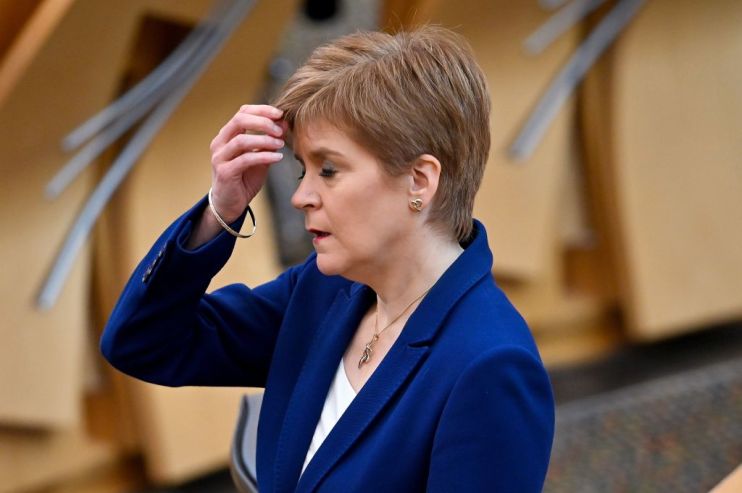Pay attention, London: Nicola Sturgeon’s spat with Alex Salmond could scupper her mission to break up the UK

At a time when Londoners are all focusing on the latest lockdown restrictions, wondering what will become of our jobs, and asking if Trump or Boris will still be in post this time next year, does anyone other than expat Scots care who wins the stair-heid rammy between Nicola Sturgeon and Alex Salmond?
But care they should.
If the Covid-19 pandemic relaxes enough for next year’s London mayoral elections to go ahead in May, so too will the elections for the Scottish Parliament. The received wisdom is that Scotland’s First Minister Nicola Sturgeon and her SNP secessionists will win again, setting up a constitutional stand-off with Boris Johnson by claiming a mandate to hold a second independence referendum.
This clashes with Johnson’s own mandate not to allow such a referendum for the duration of the current parliament. So to head off Sturgeon, the pro-union parties need to win enough seats next May to claim collectively that there is an anti-nationalist majority.
Scottish Labour, currently in third, shows no sign of a revival even under its new national leader Sir Keir Starmer. The Liberal Democrats barely have a pulse, and are polling behind the nationalist Greens.
The Scottish Conservatives, the official opposition to the SNP and in second place, have a new leader: Douglas Ross MP, who currently sits in Westminster and has to get back to Holyrood. Their former leader Ruth Davidson has returned pro tem to put Sturgeon on the back foot, landing some tidy blows — but that’s not going to be enough to stop the SNP.
The truth is that the Scottish public really don’t care what happens in Holyrood — what matters is if Sturgeon retains the trust of the people. And thus far she does.
The arrival of the Covid-19 pandemic has resulted in Sturgeon’s popularity ratings climbing, as she has taken on the task of delivering a daily briefing in a verbose but serious schoolteacher style that contrasts favourably against Johnson’s sometimes over-lyrical, faux-Churchillian, cliché-ridden pomposity.
Sturgeon has rebranded all of the economic initiatives from the Prime Minister and Rishi Sunak so they look “made in Scotland”, as well as often announcing tighter regulations north of the border that have signalled her authority. If a statistic could put Scotland’s pandemic in a more favourable light, Sturgeon has claimed success (failing that, a claim would be made anyhow).
London-based observers have typically awarded her a “better” pandemic than Johnson — although the figures never consistently showed that.
In fact, the rate of care home Covid deaths have been far higher in Scotland. That can be attributed to Sturgeon failing to mandate Covid testing for patients being transferred out of hospitals into homes until over a week after England did, right at the height of the pandemic. Also note that Scotland’s Covid-related deaths have been higher than England’s per million once you allow for lived population density.
Still, perceptions matter more than reality, and Sturgeon has a team of over 40 media staff to promote her government’s message.
In such circumstances — when opposition parties are finding scrutiny challenging, when the local media outlets are more interested in dubious comparisons between the Edinburgh and Westminster governments, when Downing Street swings from one Covid crisis to another — the threat to the SNP’s political power is more likely to be self-administered.
And so it has proved.
A fortnight ago, SNP MP Margaret Ferrier travelled by train from Glasgow to Westminster to speak in a debate after taking a Covid-test. While in London, she was told the test was positive, but instead of self-isolating she boarded a train back to Glasgow. The story broke and spurred weeks of predictable — and justifiable — outrage.
Despite suspending Ferrier from the party and demanding she resign her seat (which Ferrier refused), Sturgeon was made to look foolish that one of her people could act so irresponsibly.
Nor is the the first time an SNP figure has caused trouble for the party. It was only in February (those heady pre-Covid days, if you cast your mind back) that the SNP finance secretary was suspended for repeated inappropriate texting to a 16-year-old youth.
Now darker clouds are gathering. Sturgeon’s disagreement with her former mentor and predecessor, Alex Salmond, is getting brutal.
Following a court case in which Salmond was acquitted, there is now a Scottish parliamentary inquiry into Sturgeon’s handling of allegations of inappropriate behaviour by the former SNP leader. Sturgeon had promised to cooperate fully — but has been prevaricating on releasing emails and texts that are vital for proper scrutiny. Salmond has threatened to release said documents from his end.
Sturgeon has since implied that Salmond had been looking for her to intervene helpfully, which she refused to do. Appearing on Ridge On Sunday last weekend, she insisted: “I didn’t cover it up, I didn’t collude with him to make these allegations go away.”
But if this were verifiably true, why did Sturgeon not reveal to the police an attempt by Salmond to subvert due process? And why has she given three different dates for when she first knew of concerns about Salmond’s behaviour?
These inconsistencies would not be so damning were the SNP not relying on the public perception that their leader can be trusted. Indeed, the issue of trust is now at the heart of Sturgeon’s political future. If she loses it, she loses too any chance of winning an election that opens the door for a second referendum that could split our country asunder.
Defenders of the union should be watching how this plays out with eagle eyes.
Main image credit: Getty